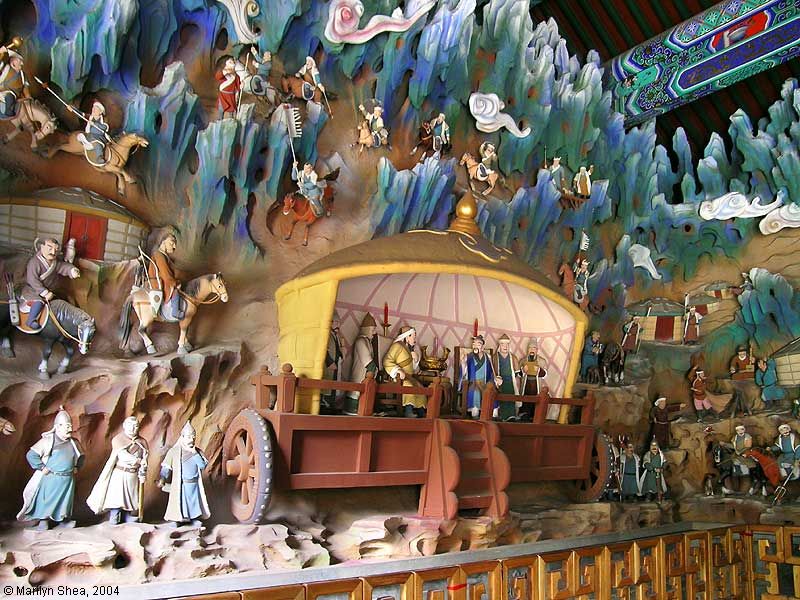Proceeding to the south-east, we stopped in the evening near an ancient aqueduct, the banks of which were covered with dense groves of lu-wei. The large ones preserve their green leaves during the whole winter. We made sticks from them, and they were so strong that they did not break when we used them for supporting the shafts of the carts during the night. On the smaller ones the leaves wither and are renewed in spring. More to the south, in the mountains, there is a large kind of bamboo with a pith, which the soldiers use for spears. We saw, also, lizards three feet in length and of a dark colour. We were now at the 29th of the third month (May 10), and six days later, the 5th of the fourth month (May 16), we arrived at the encampment of the Emperor, who had sent one of his high officers to meet the master. After being installed in his lodging, the master presented himself to the Emperor, who greeted him, and said: "You were invited by the other courts (the Kin and the Sung), but you refused. Now you have come to see me, having traversed a road of ten thousand li. I am much gratified." The master answered: "The wild man of the mountains came to see the emperor by order of your majesty; it was the will of Heaven." Chinghiz invited him to sit down, and ordered a meal to be set before him. After this he asked: "Sainted man, you have come from a great distance. Have you a medicine of immortality?" The master replied: "There are means for preserving life, but no medicines for immortality." Chinghiz lauded him for his sincerity and candour. By imperial order two tents were pitched for the master east of the emperor's tents. The emperor gave him the title of shen sien (the immortal).
At the beginning of the hot season the master went with the emperor to the snowy mountains, to pass the summer there.
The 14th of the fourth month (May 25), 1222, was fixed for explaining the doctrine of the Tao (true doctrine) to the emperor; but just as the time arrived, news was received that the Mohammedan rebels in the mountains were about to renew hostilities. The emperor decided himself to attack the enemy. Therefore the day for the master's explanations was postponed until the 1st of the tenth month, which was a felicitous day. The master begged permission to return (to Samarkand), but the emperor said: "Will you not be too much fatigued to make the journey a second time?" The master replied "It is only twenty days' journey;" but the Emperor objected: "There is nobody to escort you." The master answered: "There is a man, Yang Akou, who has received orders to go with me." The emperor then assented, and after three days he gave orders that Yang Akou should take a thousand horsemen and conduct the master back by another way (than that he had come).
Proceeding on this way, we crossed a high mountain, in which is the Shi men (Stone gate), and at a distance the rocks had the appearance of candles. An immense slab lay across these rocks, like a bridge, and beneath was a rapid torrent. Many of the soldiers' donkeys were drowned in crossing this torrent, and on its borders many dead bodies were seen lying. This defile had been taken by the armies a short time before we passed.
On our way we saw men returning from the war, who carried with them a great many corals. Some of our accompanying officers bought about fifty coral trees for two yi of silver, the biggest of them more than a foot in length; but, journeying on horseback, it was impossible to carry them unbroken.
We travelled in the daytime, and profited also by the fresh nights. In five or six days (it is not said from what place) we arrived at Sie-mi-sz'-kan, or as the city is called by the Ta shi (Karakhitai), Ho chung fu (the city between the rivers). The officers came to meet the master, and directed him to his former lodging (in the new palace), which was situated on the northern side of the river. This river (the Zarafshan) has its sources in the snowy mountains (east of Samarkand), therefore its water is very cold. The palace in which the master lived was on a hill about a hundred feet in height. It was reflected in the bright water of the river. In the fifth month (June and July), during the hot season, the master was accustomed to sit at the northern window and enjoy the breeze, while at night he slept on the terrace of the roof; and in the sixth month (July-August), the hottest time of the year, he bathed in the basin. Thus the master spent his time in the far west.
Continued ===>>>
pp. 83-88, E. Bretschneider's Mediæval Researches from Eastern Asiatic Sources. (New York: Barnes & Noble, 1888).
